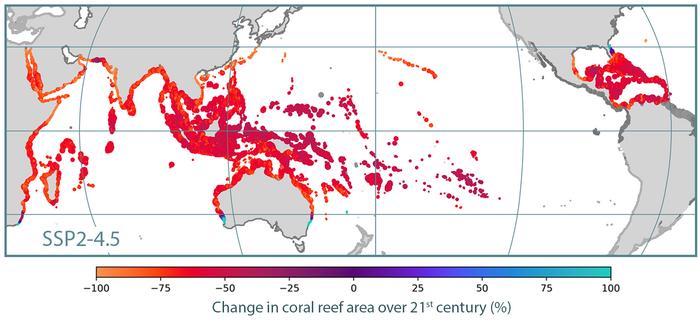In an unprecedented study combining cutting-edge computational modeling and ecological theory, researchers at the University of Hawaiʻi at Mānoa have revealed a sobering forecast for the future of coral reefs in the face of global climate change. Published in Science Advances on June 6, 2025, this investigation harnessed the immense power of supercomputing to simulate the fate of coral reef ecosystems worldwide under various greenhouse gas emission scenarios. The findings underscore a critical disparity: while coral species possess the ability to expand their geographic ranges in response to warming oceans, the velocity of this migration is woefully insufficient to outpace the rapid degradation wrought by climate change within this century.
The study’s lead author, Noam Vogt-Vincent, a postdoctoral fellow at the Hawaiʻi Institute of Marine Biology’s Marine Ecological Theory Lab, guided an integrated modeling approach that incorporated biological processes essential for coral survival, reproduction, and adaptation. His team utilized UH’s Koa supercomputer cluster to simulate ecological and evolutionary dynamics across approximately 50,000 reef sites globally. This comprehensive framework accounted for coral growth rates, larval dispersal mechanisms, genetic adaptation to heat stress, and inter-site connectivity, capturing the complexity required to predict ecosystem trajectories accurately.
Specifically, the research employed three future climate scenarios: a low warming pathway approximating a 2℃ increase by 2100, a moderate pathway reaching around 3℃, and a high warming scenario exceeding 4℃. These scenarios were chosen to reflect a range of possible global policy outcomes and their corresponding greenhouse gas emissions, thereby providing insight into how different mitigation strategies might influence coral reef persistence.
One of the study’s pivotal discoveries is that coral reefs, historically known to expand poleward during past climate shifts—albeit over millennia—will undergo this range expansion too slowly to compensate for the precipitous mass losses expected within the next 60 years. As ocean temperatures rise, coral species attempt to move into cooler, higher latitude waters where thermal stress is less severe. However, the model projects that these expansions will cover less than a thousandth of the area lost by corals in their traditional tropical habitats.
This temporal mismatch presents a daunting challenge: tropical reefs, which currently harbor the highest biodiversity and productivity, are projected to suffer up to an 86% decline if emissions continue unabated. The spatial refuges emerging toward northern Florida, southern Australia, and southern Japan appear promising but will not establish quickly enough to shelter existing tropical coral lineages before widespread die-offs occur.
From a biological perspective, the slow tempo of reef migration is governed by multiple interdependent factors. Coral larvae dispersal, essential for colonizing new locations, is inherently limited by ocean currents and larval duration. Additionally, the adaptation of coral species to increasing heat stress, including the evolution of symbiotic relationships with heat-tolerant algae, unfolds over evolutionary timescales, further delaying resilience. These constraints highlight that physical migration alone cannot serve as a short-term buffer against climate-induced reef losses.
Despite this grim outlook, the study offers a beacon of hope rooted in humanity’s immediate actions to curb greenhouse gas emissions. Under scenarios consistent with the Paris Climate Agreement’s goals, projected coral losses could be drastically minimized, falling from 86% to approximately one-third of current cover. This outcome emphasizes that policy decisions and mitigation measures enacted this decade will cast long shadows on coral ecosystems for centuries, if not millennia.
The research encapsulates both the fragility and the potential endurance of coral reef ecosystems, portraying them as living archives of climatic history that are increasingly imperiled by human activity. The findings stress the urgency of climate adaptation strategies that blend conservation, emission reductions, and restoration efforts to preserve coral biodiversity and the critical ecosystem services reefs provide.
Lisa McManus, assistant research professor and postdoctoral advisor to Vogt-Vincent, highlighted the unprecedented scope of this modeling effort, which integrates ecological and evolutionary principles at a global scale. This holistic approach is foundational to understanding complex ecosystem responses in a changing climate—moving beyond simplistic projections toward dynamic, mechanistic insights.
Future research directions will leverage high-performance computing to refine models with real-time data and expand the incorporation of stressors such as ocean acidification, pollution, and disease dynamics. Additionally, exploring interventions such as assisted gene flow, reef restoration, and management of local stressors offers promising avenues to enhance reef resilience.
The collaborative nature of this study, including contributions from scientists at the University of New Hampshire and Victoria University of Wellington, underscores the global imperative to pool intellectual and technological resources in confronting biodiversity loss. Funded by NOAA through the University Corporation for Atmospheric Research’s Cooperative Programs for the Advancement of Earth System Science, the project exemplifies the integration of scientific expertise and computational innovation.
Noam Vogt-Vincent poignantly summarized the implications: “Our actions over the next few decades will therefore have incredibly long-lasting consequences for coral reefs globally.” The study elevates coral reefs as both victims of climate change and indicators of environmental stewardship, compelling the global community to act decisively.
Subject of Research: Coral reef ecosystem responses to climate change and projected range shifts under varying greenhouse gas emission scenarios.
Article Title: UH Supercomputer Study Shows Coral Can’t Flee Warming but Urgent Action Can Still Protect Them
News Publication Date: June 6, 2025
Web References:
- https://www.science.org/doi/10.1126/sciadv.adr2545
- https://www.himb.hawaii.edu/2025/06/06/uh-supercomputer-study-shows-coral-cant-flee-warming-but-urgent-action-can-still-protect-them/
References:
Vogt-Vincent, N., McManus, L., Pringle, J., Cornwall, C. (2025). Predicted changes in coral reef distributions under climate change scenarios. Science Advances. DOI: 10.1126/sciadv.adr2545
Image Credits: University of Hawaiʻi
Keywords: Coral reefs, marine biology, climate change, ocean warming, coral adaptation, supercomputer modeling, ecological forecasting, greenhouse gas emissions, coral range expansion, marine ecosystems




